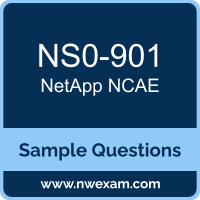 Before you write the NetApp NCAE (NS0-901) certification exam, you may have certain doubts in your mind regarding the pattern of the test, the types of questions asked in it, the difficulty level of the questions and time required to complete the questions. These NetApp Certified AI Expert (AI Expert) sample questions and demo exam help you in removing these doubts and prepare you to take the test.
Before you write the NetApp NCAE (NS0-901) certification exam, you may have certain doubts in your mind regarding the pattern of the test, the types of questions asked in it, the difficulty level of the questions and time required to complete the questions. These NetApp Certified AI Expert (AI Expert) sample questions and demo exam help you in removing these doubts and prepare you to take the test.
The best approach to pass your NetApp NS0-901 exam is to challenge and improve your knowledge. To test your learning and identify improvement areas with actual exam format, we suggest you practice with Premium NetApp NS0-901 Certification Practice Exam. The practice test is one of the most important elements of your NetApp Artificial Intelligence Expert (AI Expert) exam study strategy to discover your strengths and weaknesses, to improve your time management skills and to get an idea of the score you can expect.
NetApp NS0-901 (AI Expert) Sample Questions:
a) Predictive AI
b) Generative AI only processes pre-existing content.
Solutions:
|
Question: 01 Answer: a |
Question: 02 Answer: a, c |
Question: 03 Answer: b |
Question: 04 Answer: a, d |
Question: 05 Answer: a, b |
|
Question: 06 Answer: b |
Question: 07 Answer: a, b |
Question: 08 Answer: a |
Question: 09 Answer: d |
Question: 10 Answer: b, d |
Note: If you find any error in these NetApp Artificial Intelligence Expert (AI Expert) sample questions, you can update us by write an email on feedback@nwexam.com.
